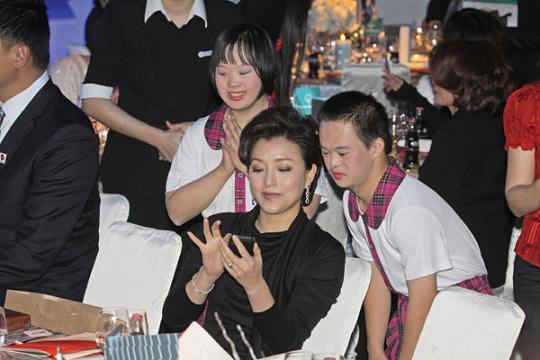
 |
| Yang Lan at a recent charity auction for the International Special Olympics in Shanghai. (China Daily/China Photo Press) |
A luminous charity ball is just the brighter side of Yang Lan's non-profit work. There's hard work and sweat behind all that glitter, Chen Nan reports.
Yang Lan is getting ready for a ball at a five-star hotel in Beijing, which was gearing up to welcome more than 200 celebrities. The 44-year-old TV host, one of the country's most famous faces and dubbed China's answer to Oprah Winfrey, emerges dressed in a red skirt suit and followed by cameras.
But Yang says she wants to show off something more: Giving back is glorious.
"I feel more real while doing charity work than when I walk on the red carpet," says Yang. "Especially when I see people whose lives have been changed in a positive way because of me. I feel much more self-contented."
The object of the ball is the Sun Art Classroom, a new charity project which will be launched in 2013 by Sun Culture Foundation. The nonprofit was started by Yang and her husband Wu Zheng, or Bruno, in 2005 with the aim of promoting a philanthropic culture in China.
Under the scheme, children of migrant families in Beijing will take art classes, including music, dance and painting.
Yang's foundation has been focusing on these children for years. What prompted her to develop a formal project for migrant children was a boy from a juvenile reformatory in Beijing whom she met five years ago.
Back in 2007, Yang invited dancers and teachers from the National Ballet of China to teach students how to dance. The goal was to put on an original ballet jointly performed by professional dancers and students of the reformatory.
The boy was sent to the reformatory because of a violent attack. He was very rebellious and resistant to the ballet classes.
But, as weeks passed, the boy came to the class and danced with others.
"One day he gave me a rose and smiled, saying that he had been selected as the male lead in the finale show," recalls Yang. "From that moment, I realized the power of art."
Then Yang invited artists to start more music courses, such as guitar and harmonica, for migrant students. She and her team also brought the students to watch performances at venues like Capital Theater and the National Center for the Performing Arts.
She admits she once had doubts about the project. "Did those students need those courses more than financial help?" she asked herself. But as time goes by, she has become more determined.
 |














 Beijing-Zhengzhou high-speed railway to start service on Dec. 26
Beijing-Zhengzhou high-speed railway to start service on Dec. 26


![]()
